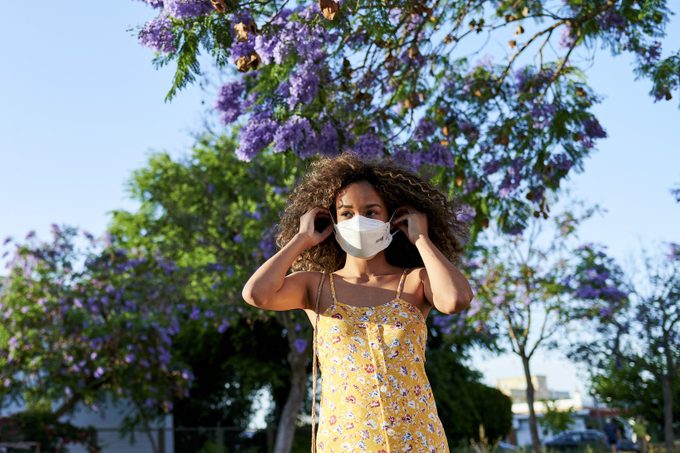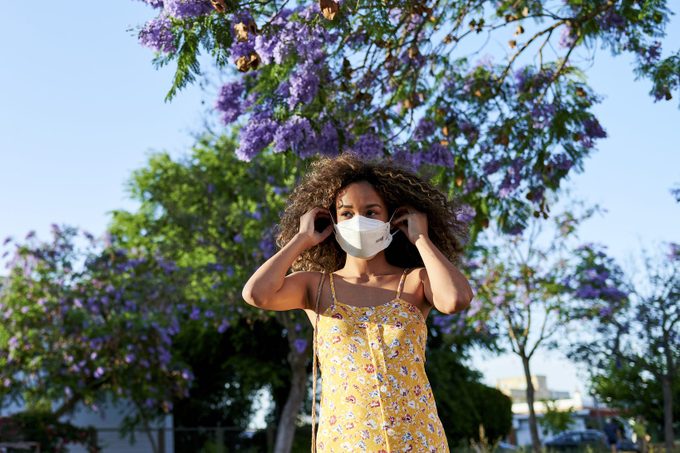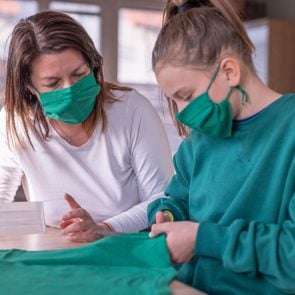Reasons why face masks might be here to stay
You know those face masks you’ve been dutifully wearing when you leave the house?
They may be doing more than protecting you against Covid-19.
They may also be a good defense against other respiratory ailments.
In fact, face masks (along with social distancing) are likely part of the reason this year’s flu season has been so mild.
The Centers for Disease Control and Prevention (CDC) documented a jaw-dropping 98 percent decrease in flu activity for the season.
So, what else can masks protect us from? Plenty.
How masks work
Face masks protect you and those around you by serving as a barrier between your potentially infected respiratory droplets and theirs.
“It’s a reciprocal thing,” says LaTasha Perkins, MD, a practicing family physician in Washington, D.C.
Simply put, a mask is a “snot barrier,” as Dennis Cunningham, MD, system medical director of infection control and prevention at Henry Ford Health System, recently put it to a group of children.
The level of protection depends on the type of droplets being transmitted (small or large) as well as on the material the mask is made from. But, in general, face masks are effective.
A 2020 study in Health Affairs, for instance, found a 2 percent decline in new Covid-19 cases three weeks after mask mandates were put in place in different states, potentially preventing 200,000 people from getting sick.
But masks block more than bacteria and viruses—they act as a barrier against air pollution, particulate matter, pollen, and more.
Here are the health ailments face masks can protect against other than the virus that causes Covid-19.
The flu
Influenza, or the flu, puts 140,000 to 810,000 people in the hospital each year and kills as many as 61,000, according to the CDC.
Even before the pandemic, research published in PLoS Pathogens showed that face masks limited transmission, reducing the spread of larger influenza droplets by a factor of 25 and smaller particles by about three times as much.
If you’re home with someone who has it, wearing face masks for the flu could reduce transmission by 60 to 80 percent, according to a report in Emerging Infectious Diseases.
In that study, though, less than 50 percent of healthy participants said they wore masks most of the time.
(Here are tips on how to stop the spread of Covid-19 at home.)
In the Northern Hemisphere, flu season typically begins in early October and peaks between December and February, sometimes later.
One of your best defenses against influenza is to get the flu shot.
After that, washing your hands and wearing a mask might be the next most helpful things you can do to protect yourself.
Common colds
The common cold may seem tame in comparison to Covid-19, but it takes a toll.
The CDC estimates that adults get an average of two to three colds a year, making it the most common reason for missed work.
Many cases of the common cold are caused by coronaviruses, which are similar to (but not as severe as) SARS-CoV-2, the specific coronavirus that causes Covid-19.
They spread the same way—via respiratory droplets—and have overlapping symptoms: coughing, headaches, body aches, sneezing, and a runny nose.
In the past, experts recommended sneezing or coughing into your elbow to prevent contaminating others. Masks can do the same thing.
“Ultimately, keeping respiratory droplets and airborne particles to yourself means you’re not spreading it onto other people,” says Dr. Perkins. “Anything spread through the nose or throat, a mask is going to prevent it.”

Allergies
Pollen and other allergens float through the air—sometimes, it seems, with the express purpose of irritating our nasal passages.
And it’s spring allergy season even as the pandemic continues.
“Masks help keep pollen from getting in your nose and causing hay fever allergies,” says Dr. Perkins.
Keep in mind: the effectiveness of a mask varies based on how big the particular allergen is.
There’s another benefit to wearing a mask, notes Dr. Perkins.
Allergic responses inflame your nose, which makes you more susceptible to infections.
Masks can do double duty here, against both pathogens and allergies.
Some doctors have reported a decrease in seasonal allergy issues in patients since Covid-19, but an increase in indoor allergies. (Most likely because people wear masks less often at home and spend more time with pets.)
One study looked at 301 nurses in Israel who had allergic rhinitis, also known as hay fever.
According to the report published in The Journal of Allergy and Clinical Immunology: In Practice, allergy symptoms declined from 43 percent to 29 percent when the nurses wore a surgical mask and to 25 percent with an N95 mask.
Air pollution
Depending on the type of air pollution, masks can also be effective, says William Bennett, professor of medicine in the Center for Environmental Medicine, Asthma, and Lung Biology at the University of North Carolina at Chapel Hill.
“Even small concentrations of [air pollution] particulate that evolve from combustion products have been shown in epidemiological studies to increase morbidity and mortality,” says Dr. Bennett.
Face masks will protect you from pollution from soot and diesel exhaust, though not from gases.
In a 2017 study published in BMJ Occupational and Environmental Medicine, researchers looked at how effective face masks were for protecting residents of Beijing, China, from air pollution.
They found that certain masks do help filter particulate matter from air pollution.
As always, it depends on the quality of the mask.
Smoke
Smoke—be it from wood, cigarettes, or something else—is another recognized health hazard.
And masks can filter out some of the fine particles, which may be toxic.
Dr. Bennett says forest fires are the biggest scientific interest in face masks outside of Covid-19.
That’s because wildfires can raise your risk for health conditions.
Houses and other structures that fall victim to flames emit a whole host of other particles, which are likely toxic as well.
Masks won’t, however, keep out noxious gases such as carbon monoxide and formaldehyde.
Although we don’t know how much smoke is gas and how much is particles, says Dr. Bennett, “it doesn’t hurt taking the particles out.”
The right mask worn the right way
Your protection from respiratory dangers is only as good as the mask you wear and how well you wear it.
Always cover your nose and mouth, advises Dr. Perkins.
Don’t use a mask with a vent and make sure the mask fits closely on the sides and the bottom. If a mask has a vent, that means you are exhaling unfiltered air, and they won’t protect the people around you.
Surgical masks are the most efficient, followed by cotton, says Dr. Perkins.
Wearing two masks is thought to enhance protection, and recent research in JAMA Internal Medicine suggested that wearing a medical mask underneath a cloth mask provided the best improvement in filtration efficiency compared to other combinations.
Fit is even more important than the type of material, says Dr. Bennett.
Wearing a bandana or neck gaiter over a surgical mask doubles efficiency because the pressure conforms the mask to your face, says Dr. Bennett.
Masks, of course, are just one part of the picture. Social distancing also helps slow the spread of Covid-19 and other infections and irritants.
And don’t forget to vaccinate. The Pfizer-BioNTech and Moderna vaccines are each about 95 percent effective at halting Covid-19.
The post 5 Reasons to Wear a Face Mask Other Than Covid-19 appeared first on The Healthy.








